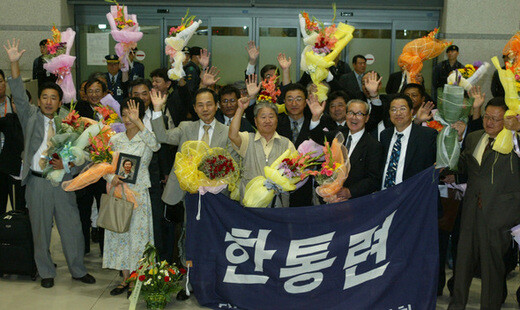hankyoreh
Links to other country sites 다른 나라 사이트 링크
Gov’t blocks Hantongryeon from entering S. Korea, labeling it ‘anti-state’

Seven members of Hantongryeon, the Korean Alliance for Democracy and Reunification in Japan, including Vice Chairman Song Hyeong-geun, attempted to enter South Korea to participate in an annual commemorative event held at Mount Geumgang June 15-16 but were denied entry, with Seoul declaring the group as being against the state. The seven group members, all South Koreans residing in Japan with South Korean passports, entered North Korea via Beijing.
Hantongryeon was established by a group of Korean residents in Japan to promote the democracy and reunification of Korea in 1973. When the life of former President Kim Dae-jung, who at the time was a pro-democracy activist against the dictatorship of President Park Chung-hee, was threatened by the Korean Central Intelligence Agency, the predecessor to the National Intelligence Agency, the group campaigned to save his life.
In a telephone interview with The Hankyoreh on June 24, Song Se-il, the secretary-general of the organization, said that group members thought it would be meaningful to go to North Korea via their motherland of South Korea, rather than entering the North via a third country. They were denied entry by South Korean authorities on May 28, however, when the government declared Hantongryeon an “anti-state organization.”
The seven members of the group have visited South Korea freely in the past, and having the government of President Lee Myung-bak take issue with it now is like turning back the hands of time, Song added.
The group was unable to gain approval for their North Korea visit under a regulation that restricts groups labeled “anti-state” and “pro-enemy” from traveling to the North.
However, the members of Hantongryeon were permitted to visit South Korea in 2002 and 2004 under the government of former President Roh Moo-hyun. They said they had been rehabilitated when they met with former President Kim during a previous visit to South Korea, according to the group.
In addition, approximately 10 Hantongryeon members participated in an event held in May to commemorate the April 3 uprising, after President Lee took office and without any problems. The April 3 uprising took place from April 3, 1948, to September 21, 1954, and it resulted in approximately 30,000 casualties.
The government’s sudden disapproval of the group’s entry into the North is likely to incite controversy. An official of the National Intelligence Service said, “As Hantongryeon hasn’t been removed from a list of anti-state organizations, the government did not allow its members to visit the North via the South. Besides, key figures of the group who want to enter South Korea should come under investigation in connection with past incidents.” Regarding the fact that key figures of Hantongryeon were allowed to visit South Korea in the past without being investigated, the official said that their visits to the North were permitted on a limited basis due to the situation at the time.
Hantongryeon was designated as an anti-state organization when, in a 1978 Supreme Court ruling, one of its members, Kim Jeong-sa, who was a Korean resident in Japan at the time, was designated as a spy. However, a fact-finding committee of the National Defense Ministry announced in November 2007 that the incident had been manipulated, saying that Kim’s behavior was not consistent with spying. The committee supported Kim’s assertion that he had made a false confession after being tortured.
Please direct questions or comments to [englishhani@hani.co.kr]
Editorial・opinion
![[Column] Season 2 of special prosecutor probe may be coming to Korea soon [Column] Season 2 of special prosecutor probe may be coming to Korea soon](https://flexible.img.hani.co.kr/flexible/normal/500/300/imgdb/original/2024/0426/3317141030699447.jpg) [Column] Season 2 of special prosecutor probe may be coming to Korea soon
[Column] Season 2 of special prosecutor probe may be coming to Korea soon![[Column] Park Geun-hye déjà vu in Yoon Suk-yeol [Column] Park Geun-hye déjà vu in Yoon Suk-yeol](https://flexible.img.hani.co.kr/flexible/normal/500/300/imgdb/original/2024/0424/651713945113788.jpg) [Column] Park Geun-hye déjà vu in Yoon Suk-yeol
[Column] Park Geun-hye déjà vu in Yoon Suk-yeol- [Editorial] New weight of N. Korea’s nuclear threats makes dialogue all the more urgent
- [Guest essay] The real reason Korea’s new right wants to dub Rhee a founding father
- [Column] ‘Choson’: Is it time we start referring to N. Korea in its own terms?
- [Editorial] Japan’s rewriting of history with Korea has gone too far
- [Column] The president’s questionable capacity for dialogue
- [Column] Are chaebol firms just pizza pies for families to divvy up as they please?
- [Column] Has Korea, too, crossed the Rubicon on China?
- [Correspondent’s column] In Japan’s alliance with US, echoes of its past alliances with UK
Most viewed articles
- 1No good, very bad game for Korea puts it out of Olympics for first time since 1988
- 2[Column] Season 2 of special prosecutor probe may be coming to Korea soon
- 3Korea’s 1.3% growth in Q1 signals ‘textbook’ return to growth, says government
- 4‘We must say no’: Seoul defense chief on Korean, USFK involvement in hypothetical Taiwan crisis
- 5Is N. Korea threatening to test nukes in response to possible new US-led sanctions body?
- 6Division commander ordered troops to enter raging flood waters before Marine died, survivor says
- 7[Column] ‘Choson’: Is it time we start referring to N. Korea in its own terms?
- 8Will NewJeans end up collateral damage in internal feud at K-pop juggernaut Hybe?
- 9Korea sees more deaths than births for 52nd consecutive month in February
- 10[Editorial] Korea’s surprise Q1 growth requires objective assessment, not blind fanfare